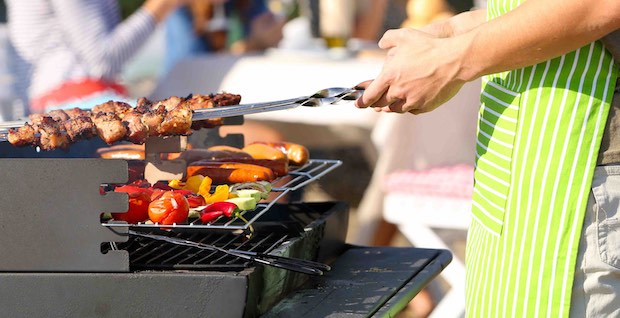How to Reduce Cancer Risk from Backyard Barbecue
With summer heating up, millions of people are cooling off in swimming pools, lakes, streams and the beaches. Virtually everyone has heard warnings about making sure they use enough sunscreen to help prevent the sun from damaging their skin. We are all warned to use sunscreens with SPF of 25 or higher and to re-apply the sunscreen regularly while one is out in the sun. In fact, we are told to use sunscreen even if not swimming, but just out doing yard work, playing, hiking, or anything outside.
Summer is also the time of year for vacations, where many people are outside and traveling. There are many safety tips to pay attention to when traveling on vacation.
Summer is also the time when so many people fire up their barbeque grills. Some like grilling outside because it helps reduce the amount of heat in the kitchen, thus saving on the electric bill (the air conditioning). Some like grilling outside because it serves as a way to help with social gatherings. Others, like myself, like to barbecue because the food tastes great. Personally, my wife and I love the taste of steak, pork ribs and chicken on the grill.
However, research in recent years has led to warnings about the carcinogenic risks of grilling meats on the barbecue. I recall hearing one newscaster asking why is it that most everything that tastes great is bad for us. He mentioned things like bacon, sausage, bacon cheeseburgers, cookies, cakes and ice cream.
So, as you head out back to fire up your barbecue, remember this:
Research suggests that meat, including beef, pork, poultry or fish, forms carcinogenic chemicals called heterocyclic amines (HCA) and polycyclic aromatic hydrocarbons (PAH) when charred or cooked over high heat, as on a grill (it’s what you think of as “grill marks”). In laboratory experiments, these chemicals have been “found to be mutagenic—that is, they cause changes in DNA that may increase the risk of cancer,” according to the National Cancer Institute.
Theodore M. Brasky, a cancer epidemiologist and assistant professor at the Ohio State University’s Comprehensive Cancer Center, told HuffPost that there is a “wealth of data” about the effects of HCAs and PAHs on other animals, on which many of the studies have been conducted. But when it comes to humans, that data is less concrete.
“Studies in people are in some ways more complicated because it’s difficult to control all aspects,” he said. “But there is nevertheless a lot of evidence from epidemiological studies that show that healthy individuals who report eating well-done or barbecued meats tend to have higher occurrence of cancers of the GI tract (especially colon cancer) over time, after taking into account other factors.”
Some of their recommendations include removing any charred areas of the meat. They suggest that turning the meat more frequently will help prevent charring and thus reduce the risk of developing some form of cancer.
Cooking the meat at a lower temperature also helps reduce the cancer risk factors.
Other tips include trimming off as much fat as possible and to marinade the meat before grilling as the marinade helps place a barrier between the meat the flame.
Most importantly, the experts recommend grilling in moderation. Remember, like eating red meat, the more often you grill, the greater your chances of developing a cancer.
My bottom line is – enjoy your summer barbecue, but grill smart so you can enjoy grilling for many more years to come.









Recent Comments